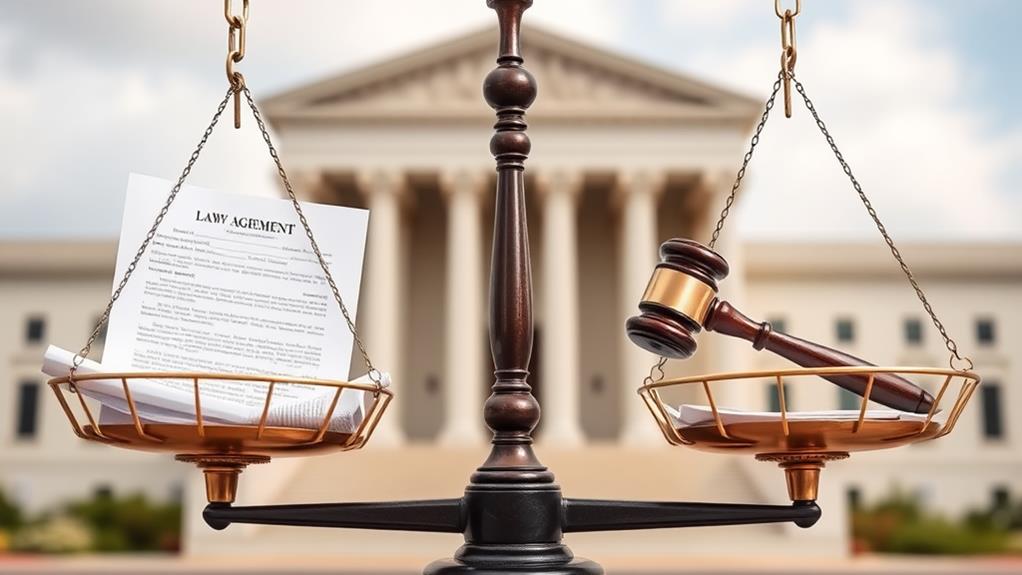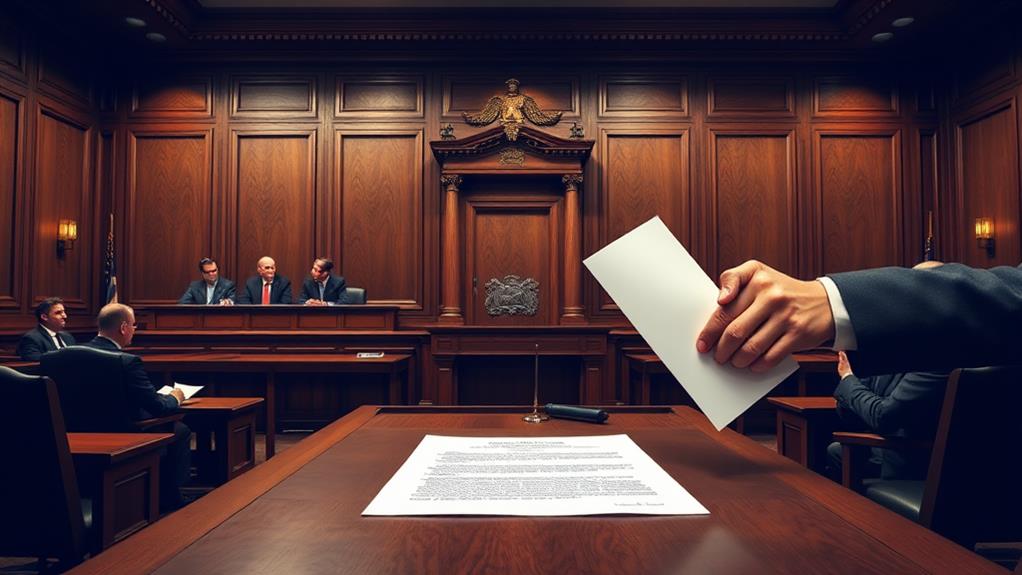Weighing settlement agreements against trials involves considering several factors. Settlements offer quicker resolution, lower legal fees, and less emotional stress, but they often result in lower compensation and no chance for further claims. Trials can provide potentially higher payouts, detailed evidence examinations, and public accountability, but they come with high costs, lengthy timelines, and emotional burdens. Confidentiality in settlements is appealing, yet it sacrifices the chance for public scrutiny. In deciding, you’ll need to balance the urgency of financial needs against the unpredictability and potential benefits of a trial. Understanding these aspects can guide your decision-making process.
Understanding Settlement Agreements

In settling disputes outside the courtroom, settlement agreements play a significant role. These are legally binding contracts between the injured party and the defendant, allowing you to negotiate compensation without enduring lengthy trial proceedings. Rather than waiting for a court decision, settlement agreements provide a quicker resolution, helping you cover medical expenses and lost wages sooner.
However, the compensation negotiated mightn’t fully reflect the damages you’ve incurred. During negotiations, it’s essential to understand the common terms within these agreements. The release of liability is a key component, preventing you from pursuing further claims against the defendant. This can limit your recourse if your condition worsens or additional damages surface.
Settlement agreements often include confidentiality clauses to protect sensitive information, ensuring your privacy is maintained. While evaluating these terms, remember the legal binding nature of settlement agreements. Once accepted, you’re unable to revisit the case.
The trade-off between potentially lower compensation in settlements versus the uncertainty of trial outcomes requires careful consideration. Understanding these dynamics helps you make informed decisions about whether to pursue a settlement agreement or proceed to trial. This knowledge empowers you to decide what best serves your needs.
Benefits of Settling a Case
Opting to settle a case can streamline the entire resolution process, getting you quicker access to the compensation you need. Settlements often lead to faster compensation, which means you can address urgent financial needs like medical bills and lost wages without the lengthy wait time associated with trials.
By choosing a settlement, you also benefit from lower legal fees, as settlements typically avoid the extensive preparation and court procedures that escalate legal costs.
Another significant advantage is the confidentiality it offers. Settlements keep the details and terms private, protecting your personal and sensitive information from public scrutiny. This privacy can be essential if you wish to maintain discretion regarding the case’s circumstances.
Settlements also allow for tailored agreements, offering flexibility to include non-monetary provisions such as apologies or commitments to future medical care—options that mightn’t be available with a trial verdict.
Furthermore, avoiding trial means less emotional stress and unpredictability, allowing you to recover and move forward with peace of mind.
Ultimately, settlements can mitigate financial losses by providing a quicker, more economical resolution, helping you focus on rebuilding your life with greater stability and assurance.
Drawbacks of Settling

While settling a case might seem advantageous at first glance, it’s important to recognize the potential drawbacks. Settlements often result in lower compensation than you might receive at trial. This compromise doesn’t always account for the full extent of damages the injured party has suffered.
Once you accept a settlement, pursuing further claims against the defendant is generally off the table, even if unforeseen complications arise later.
The negotiation process can be challenging, especially if there’s a disparity in resources or legal representation. Without proper support, you could end up with unfavorable terms that don’t serve your best interests.
There’s also the pressure to accept a settlement quickly. This urgency can lead to regretting a decision you haven’t fully considered, especially when the long-term implications remain unclear.
Furthermore, settlements don’t hold defendants publicly accountable, nor do they establish a legal precedent. This lack of accountability can allow negligent behavior to continue unchecked, as there’s no public record of wrongdoing.
Advantages of Going to Trial
One compelling advantage of going to trial is the potential for higher compensation. When you opt for a trial, juries can award larger sums for pain and suffering compared to settlement offers, which often require compromise. This financial incentive can be significant, ensuring you receive the compensation you truly deserve.
Trials also allow for a thorough examination of evidence and witness testimonies. This means you can present your case in full, highlighting every detail that supports your position. Unlike settlements, which might gloss over some aspects, trials give your story the stage it needs.
Additionally, the public nature of trials holds defendants accountable for their actions, sometimes leading to broader changes in industry practices. This transparency can raise awareness about negligent behaviors and push for improvement.
Successful verdicts from trials can set legal precedents, influencing how similar future cases are handled. This not only benefits you but also contributes to shaping the legal landscape for others.
Moreover, if you’re unhappy with the trial’s outcome, you have the right to appeal unfavorable outcomes. This opportunity for a second review isn’t available once a settlement is accepted, making trials a more flexible option.
Challenges of Court Trials

Despite the allure of a potential high reward, maneuvering a court trial comes with its own set of challenges. Court trials are notoriously time-consuming, often stretching over months or even years. This delay can considerably postpone any compensation you might receive, affecting your financial stability.
Additionally, the costs involved are substantial. Paying attorney fees, court fees, and expenses for gathering evidence can quickly add up, frequently surpassing the costs of settling out of court.
Emotionally, trials can be grueling. You might’ve to testify and relive traumatic experiences, which adds an emotional burden not everyone is prepared to handle.
The uncertainty of outcome is another intimidating factor. There’s no guarantee of a favorable verdict, so you risk receiving no compensation if the jury decides against you.
Public scrutiny is another challenge. Trials are public, and sensitive information about your personal life can become exposed, impacting your privacy. This exposure is something you should consider carefully.
In short, the path of a court trial is fraught with challenges that extend beyond the promise of winning. It’s essential to weigh these factors carefully before deciding to pursue litigation.
Conclusion
You’re at a crossroads, deciding between settlement and trial. Settling might offer certainty and save time, but it could leave you wondering what might’ve been achieved in court. Trials promise a chance for justice and full vindication, yet they’re unpredictable and demanding. Weigh your priorities carefully—each path offers unique risks and rewards. The decision hinges on your goals and tolerance for uncertainty. Choose wisely, as this choice will shape your future in unexpected ways.


Leave a Reply